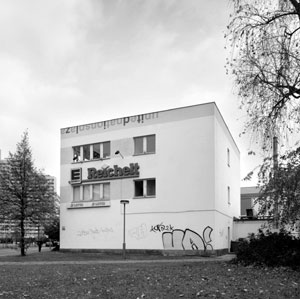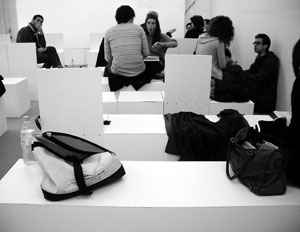Anton Vidokle
Unitednationsplaza
2006:Dec //
Emilie Bujes / Where does this strong interest to propose a new „school“ come from, even though there are some alternative art schools around the world – like the free universities? Is there really an educative will on your side or do you rather see it as an open and experimental ‚forum‘ of discussion?
Anton Vidokle / Actually there is a bit of confusion about unitednationsplaza – it’s not a new school or an innovative educational model. Basically the group of people I am collaborating with on this project is interested in the notion of exhibition as school, or how to structure a visual art institution that does not privilege display. In this sense the project is more of an „alternative“ exhibition model rather then an „alternative“ educational model. The reason why this seems urgent is that discourse, research and production do not coexist easily with display of visual art, and even though all the museums, biennials and even art fairs are now hosting elaborate symposia, talks, educational programs, etc – these events are always marginal in relationship to the main business of displaying or selling and buying art.
Bujes / Do you think that this initiative is specifically making sense in Berlin? Did you decide to come to Berlin because of its political as well as cultural past (the divided city), which could, of course, in a sense carry on the process you had started in Nicosia, even if the context is different as the wall has fallen?
Vidokle / I really hope unitednationsplaza makes sense in Berlin as it is one of the few cities where it could be possible as an independent project: Berlin has a dense concentration of artists, writers, curators, etc.; it is very inexpensive and very central, making it easy for people from outside of Germany to come and take part in our activities. Personally I always found Berlin interesting because of the complex political and cultural history, but I would not see this as a kind of a literal answer to Nicosia – the divisions are/were not the same.
Bujes / Is there something you wish to say about manifesta? – I know you must be probably tired of explaining your point of view and what happened, but I have the feeling, Manifesta 6 is simply so much on the backdrop of unitednationsplaza that it could make sense to tell something about it again...
Vidokle / The most exciting thing about unitednationsplaza for me is that now it has started developing its own very unique identity based on the input of all the people involved with this project and its context – it is by no means merely an execution of some pre-planned ideas transplanted from Cyprus to Berlin.
Bujes / How did the project start? Did you decide yourself who you wanted to do it with or was it more a „kitchen“ discussion between you and some of the other organizers?
Vidokle / Well, I could not just decide this by myself as the project requires collaboration of so many people, so when it became clear that Manifesta 6 is completely dead, I wrote to all the people I was working with to see if they wanted to try to continue this independently. All of them said yes and then I moved to Berlin to start setting up the infrastructure for the project, and together we started rethinking how this could be materialized at this new location. I wanted then to start with Boris’ [Groys] seminar, called „After the Red Square“, because I think that his work on the post-communist condition is something fundamental to the kind of the discussion that will take place over this coming year, underscored by our actual location – Lenin Platz.
Bujes / Do you plan to export unitednationsplaza in other places like you did for the e-Flux video rental?
Vidokle / Probably not in its entirety as it is really a very big and complex project. However, we have been getting many invitations for various projects to be developed by unitednationsplaza and based on ideas we generate at our space. For example: we are now guest editing an issue of an art journal from Dublin that will come out early next year, and also unitednationsplaza has been invited to develop a special conference program for Madrid in February, and possibly in Beirut next fall. In this sense unitednationsplaza functions as a kind of a „kitchen“: ideas and programs developed here will be circulating through other cities and institutions.
Bujes / I noticed that you are always very discreet – or even invisible – in the projects you actually founded yourself; are you going to attend all the seminars?
Vidokle / Of course I am attending all the seminars – in a way it’s like a school that I would have really loved to have gone to, had it existed before.
Bujes / And finally, do you think that the „documenta 12 magazine“ has the same kind of aim as unitednationsplaza?
Vidokle / Actually documenta’s magazine project seems a bit problematic to me: it presents itself as a kind of a utopian, all inclusive exercise – a Babel of magazines, however the more I learn about it, the more it looks like a hegemonic gesture by which an already powerful Western institution positions itself to dominate the discourse in the international art world for a period of time. As the discussion around contemporary art is already very much dominated by a kind of a univocal perspective perpetuated by the few leading art journals, this documenta project limits the topics of discourse even further by imposing its own thematic on much of the regional and smaller publications. I am not sure if this is very productive and such an approach is really the opposite of what happens at the unitednationsplaza.
For more information: www.unitednationsplaza.org
Next seminar: Walid Raad & Jalal Toufic
“The Withdrawal of Tradition Past a Surpassing Disaster“
Platz der Vereinten Nationen 14a, 31.1.–12.2.2007

Unitednationsplaza (© Sandra Bartoli)

Seminar (© unitednationsplaza)
Download
 Anton Vidokle / Unitednationsplaza
Anton Vidokle / Unitednationsplaza
vonhundert_0612_1415.pdf (195.57 KB, application/pdf)